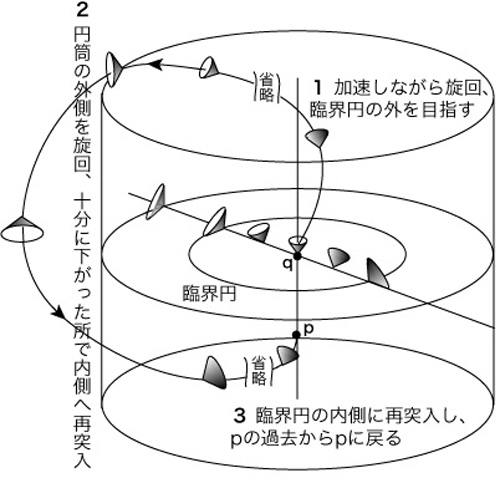I’ve been reading an advance copy Neal Stephenson’s new novel, Anathem, preparing to introduce his reading at Moe’s on Wednesday, Sept 10, 2008. The book goes on sale nationwide on Tuesday, September 9, 2008.
Anathem is heavy in every good sense of the word, one of the best SF novels I’ve read in the last couple of years. I’d put it up right there with Charles Stross’s Accelerando and my own Postsingular, not to mention the esteemed recent works of my cyberpunk pals Gibson, Sterling, and Shirley. It’s truly twenty-first century SF, amazingly broad, deep, and well-informed with, at times, the flavor of a classic philosophical treatise.

One particular SFictional/philosophical theme that Stephenson takes on in Anathem is the question of whether our consciousness might span multiple universes, as well as wider questions about ways in which alternate universes might influence each other.
Stephenson advocates a radical notion under which some possible physical universes might in fact be something like a Platonic world of forms relative to some other universes—he calls this Complex Protism, although we Earthlings might call it Complex Platonism.

The MIT physicist Max Tegmark actually has written some papers discussing a somewhat similar notion—see, for instance his online paper (PDF format) “The Mathematical Universe.”
Here’s Neal’s official website (updated as of yesterday), and a casual personal website that he sporadically maintains.

Neal likes to write long books, and I’d estimate Anathem to be some 370,000 words long, that is, three or four times the length of a typical novel such as we lesser mortals might pen. He liberally uses many made-up words, so at first you’re continually flipping back to the Glossary at the book’s end. A bit of a learning-curve, but after a few hundred pages I was totally into the book.
Rather than going into full plot-spoiling detail about the book, I’ll just paste in some passages that for one reason or another particularly pleased me, marking the quotes by indenting them with a line in the margin. Think of this as a preview reel. Most of the photos were taken in Santa Cruz, CA, this weekend.

The main characters in Anathem are a bit like cloistered academics, and often get into dialogs not unlike what you’d find in Plato’s writings. At one point, our hero and a friend are watching two colonies of ants fighting each other.
”…You look down on it from above, and say, ‘Oh, that looked like flanking.’ But if there’s no commander to see the field and direct their movements, can they really perform coordinated maneuvers?”
“That’s a little like Saunt Taunga’s Question,” I pointed out. “Can a sufficiently large field of cellular automata think?”

Describing a revered philosopher/mathematician, Saunt Bly, who’d been expelled from his enclave:
…to live out the remainder of his days on top of a butte surrounded by slines who worshipped him as a god. He even inspired them to stop consuming blithe, whereupon they became surly, killed him, and ate his liver out of a misconception that this was where he did his thinking.
Note that “slines” are common people, and their name is derived from the central letters of “baseline.” “Blithe” is a tweaked plant that’s rich in the psychoactive agent called allswell.

Discussing how the outer word of “Saeculars” views the enclosed world of the philosophical orders:
“The Saeculars know that we exist. They don’t know quite what to make of us. The truth is too complicated for them to keep in their heads. Instead of the truth, they have simplified representations—caricatures—of us. Those come and go… But if you stand back and look at them, you see certain patterns that recur again and again, like, like—attractors in a chaotic system.”

Our hero’s mentor teaches him about the importance of seeking the gnarl in your everyday surroundings:
“That is the kind of beauty I was trying to get you to see,” Orolo told me. “Nothing is more important than that you see and love the beauty that is right in front of you, or else you will have no defense against the ugliness that will hem you in and come at you in so many ways.”

Our hero is talking to his sister about how they’re going to face a possible alien invasion. He’s recently been in a stationery store. His sister is asking what other supplies they might use to try and defend Earth. They joke like mathematicians…
“Do you need transportation? Tools? Stuff?”
“Our opponent is an alien starship packed with atomic bombs,” I said. “We have a protractor.”
“Okay, I’ll go home and see if I can scrounge up a ruler and a piece of string.”
“That’d be great.”

Discussing what it is that our ruling class really wants to take from the common people.
The Powers That Be would not suffer others to be in stories of their own unless they were fake stories that had been made up to motivate them. People … had to look somewhere outside of work for a feeling that they were a part of a story, which I guessed was why Saeculars were so concerned with sports, and with religion. How else could you see yourself as part of an adventure? Something with a beginning, middle, and end in which you played a significant part?

One of the book’s numerous definitions.
Dialog: A discourse, usually in formal style, between Theors. … In the classic format, a Dialog involves two principals … Another common format is the Triangular, featuring a savant, and ordinary person who seeks knowledge, and an imbecile.

A discussion between our hero and his mentor Orolo about what we’d call the Multiple Universes hypothesis.
“You’re saying that my consciousness extends across multiple cosmi,” I said. “That’s a pretty wild statement.”
“I’m saying all things do,” Orolo said. “That comes with the polycosmic interpretation. The only thing exceptional about the brain is that it has found a way to use this.”
By the way, my friend Nick Herbert has written a really good essay on the slippery topic multiversal consciousness: “Quantum Tantra.”
David Deutsch has also written some good stuff on multiversal computation, see my It from Qubit post on this.

A mention of my favorite mathematician, the philosopher-king Kurt Gödel, in a discussion about Gödel’s rotating universe model, in which a sufficiently long round trip can lead back into your past!
“On Laterre, the result was discovered by a kind of Saunt named Gödel: a friend of the Saunt who had earlier discovered geometrodynamics. The two of them were, you might say, fraas in the same math.”
“Saunt,” similar to our word Saint, is a shortening of “savant.” A “math” is an enclave where dedicated scholars live, and a male scholar of this type is a fraa.

Re. Gödel’s model of the universe, see a nice essay by John Bell summarizing how it can lead to multiple universes. The cool image here is from a Japanese essay about Gödel’s universe.

The people in Anathem have something like our Internet, which is called the Reticulum.
“The functionality of Artificial Inanity still exists … for every legitimate document floating around on the Reticulum, there are hundreds or thousands of bogus versions—bogons as we call them.”

Two miles away—directly across the facet—was a hydrogen bomb the size of a six-story office building. It was essentially egg-shaped. But like a beetle caught in spider’s webbing, its form was blurred by a fantastic tangle of strut-work and plumbing…
Yaaar! We’re talking real SF!
I just finished the book, and I’m sorry to be done. Looking up into the sky, I notice a shiny…metal flying machine. My God! I live on a planet with flying machines! Oh, wait, I knew that already. Anathem makes everything seems surprising.









September 8th, 2008 at 7:37 pm
“Can a sufficiently large field of cellular automata think?”
Zowie. That hit me like a lead pipe. Haunting. Can one’s first glimmerings of gnarl be frightening? Whenever I stop by here I feel like I’ve inadvertently stepped onto a roller coaster that’s in search of fast-moving, well-meaning icebergs…
September 9th, 2008 at 8:13 am
When I read the excerpt about “seeking the gnarl in your everyday surroundings” I got goosebumps. Just last night I wrote something inspired by the same line of thought while describing the artwork my wife and I create.
Funny, I find myself surprised (judging by physical reaction) to see intuitive knowledge written down by someone else (whom I am fully aware is not new to these concepts) which in itself creates a loop back into appreciating what has been, and always is, right there in front of me. Sometimes it is difficult to fully grasp our own lessons unless someone else instructs us in them. What a mental room with mirrors on every wall!
September 9th, 2008 at 1:27 pm
hey, you might be able to make a hell of a living reviewing other peoples art. you made me want to read it, oh wait I wanted to read it before …
why is it we have to go to Berkeley to for a good book opening? Don’t they know we have Stanford and Keplers? You ever go to Keplers? No way I can make Berkeley on a Wednesday night.
glad he didn’t disappoint
September 9th, 2008 at 9:23 pm
Where’s the music ?
September 10th, 2008 at 1:53 am
“Where’s the music ?”
here’s some info … check this blog [ http://blog.longnow.org ] and these three related entries:
Iolet: The Music of Anathem – August 22nd
Neal Stephenson and the 10,000-Year Clock – September 2nd
Anathem Event details – September 9th
September 10th, 2008 at 7:21 am
The trailer or preview film of Anathem has some of the music as soundtrack.
In a way the trailer is disorienting, as it puts specific faces on the characters, whom you might otherwise imagine looking a different way. And, just to be able to film something, the trailer emphasizes what some might consider to be the less crucial scenes of the book: that is, physical fights using martial arts. But you might like it, also it’s a chance to hear the music, which is impressively weird.
A CD of the music was handed out with the reviewer reading-copies of the book, but is apparently not being distributed with the retail copies of the book. You can buy a CD of the music separately. The music is kind of like Gregorian chanting, and was, I believe, composed by David Stutz according to arcane mathematical principles, including cellular automata.
September 10th, 2008 at 9:22 am
Rudy-
The book does not come with the CD you mentioned.
After I finish this e-mail I intend to call Harper-Collins and find out what’s going on.
I will check back soon.
September 10th, 2008 at 9:44 am
Here’s the nitty with the CD.
The publisher never intended to include it with the book.
As a promotional it was sent out with review copies only.
Then the blogosphere went off on it’s own tangent-and
most buyers were led astray by rumors.
This seems believable- but you can make your own judgment on this call.
September 10th, 2008 at 12:03 pm
I believe I have met a few bogon-emitters in my day.
September 10th, 2008 at 12:40 pm
Howard and MondayTuesday, thanks for clarifying this.
I edited my earlier comment now to be less bogonistic. As a Rhetor, I can change the past.
Once again: the CD was only free with the advance review copies of the book, and ordinary readers would have to buy the CD separately if they want it. As I mentioned B4, you can get a small taste of the sound on that “trailer” of the book on the Anathem website.
It’s interesting and amusing that Stephenson encouraged a friend to make a CD to go with his book, but certainly you don’t need to hear the music in order to appreciate the novel. Even though I love the novel, and I have the CD, I still haven’t played the whole thing—it’s by no means easy-listening. But I do plan to spend some time on it.
In any ase, if you become obsessed with the book, you may want that CD at some point, and the profits go to a good cause: the Long Now Foundation.
I’d eventually expect there to be some online CG models of things from the book as well…
September 10th, 2008 at 1:52 pm
[Edited for ambiguity and civility by RR.]
How dare you compare Accelerando to Neal Stepehenson’s ANYTHING?
September 10th, 2008 at 2:44 pm
Tastes differ, J. But we can be polite about our opinions anyway.
September 10th, 2008 at 3:24 pm
Stepehenson’s Anything has a lot to recommend it, but I prefer the sequel, Anything More.
September 11th, 2008 at 2:50 am
” I live on a planet with flying machines!”
What’s your view about the Large Hadron Collider?
I heard one of the scientists in charge, on the radio today, and he sort of reminded me of your character Harry in Master of Space and Time. ie He was mad and didn’t have clue what was going to happen!
September 11th, 2008 at 5:21 am
Heck, I’ll read Anything by Neal Stephenson. Er, what’s it about?
September 11th, 2008 at 7:59 am
Sorry, I may have confused Neal Stepehenson and Neil Stepehenson (neither to be confused with Neal Stephenson). Are you saying they both wrote a book called Anything? Or all three of them did? How many universes are there anyway?
September 11th, 2008 at 1:04 pm
Maybe it was Robert Louis Stepehenson?
And Marc, normally I’d chuckle at that “How many universes are there anyway?” But, um, did they fire up the Large Hadron Collider in your universe yesterday? They did in mine.
September 11th, 2008 at 3:15 pm
if mark laid low the Andrew Stephenson would bolt the pringle to the Stanley Robinson & thereby advance the LHC so that the Time Out of Joint marrield the BOB Wilson (and Colin) with the Sladek within the Sinrad – anyway just a thought – lovely pictures
September 11th, 2008 at 3:16 pm
Yes, they did fire it up. In fact, I’m watching it on the LHC livecam right now. Oh, that’s interesting. Looks like it’s finally warmed up. Something’s not quite anything more oh three-lobed eyeeyeyegodnope epondogeyeyeeye debol-eerht ho erom gnihtyna etiuq ton s,gnihtemoS .pu demraw mraw mraawwwwwwww
September 11th, 2008 at 3:17 pm
And yes, you are getting mraaaaaaaw-er
September 11th, 2008 at 3:22 pm
I find myself still baffled by J’s statement, which remains ambiguous enough to constitute a riddle of the ages, or anyway this one:
“How dare you compare Accelerando to Neal Stepehenson’s ANYTHING?”
I still don’t know if this means Acclerando is so great that it cannot share a podium with any of Stephenson’s lowly works, or whether Stephenson’s books are so supernal that Acclerando needs to be pushed off into the next universe so there’s no chance of them coexisting. Is J a Stephenson fan or loather? Does he worship Stross or deplore him? The snark itself illuminates nothing…in fact, it is utterly even-handed in sowing confusion about both authors.
September 11th, 2008 at 3:56 pm
Neal gave a great reading and a witty Q&A session last night. Here’s a picture of him:
September 11th, 2008 at 4:38 pm
I covet his pate.
September 12th, 2008 at 4:51 am
Pate? Stuff gives me gas. Try the pimiento cheese sandwiches.
September 12th, 2008 at 7:30 am
Rudy,
Is the bald guy in the trailer Neal Stephenson?
September 12th, 2008 at 8:11 am
Many worlds or no worlds?
http://www.cyriak.co.uk/lhc/lhc-webcams.html
September 12th, 2008 at 10:35 am
Tom, I don’t think Neal is in the trailer, at least he didn’t mention this to me. There are a number of characters in the book with shaved heads, these are the martial arts avout of Ringing Vale.
Neal said that when the publisher asked him about having a trailer, he thought they were kidding, and just said, “Sure, why not,” and then the pubs found a guy who went off and made the whole trailer on his own for not all that much money.
September 13th, 2008 at 1:01 pm
Neal is in the trailer for about 1 second — he’s shown in one of the giant videoscreens that Erasmus is gaping at.
September 15th, 2008 at 8:01 am
Man I’ve got to read this book!! Reading this blog might be the next step for evolution for humans. Reading this I feel like a better human, with this great knowledge and truth. I like the relgion and media part. You know Neal that stuff is like opium for the masses it’s a mean of control. Like keeping slaves uneducated so they wouldn’t revolt. the same as it is today they keed us sedated and fearful. Noam Chomsky was saying something along these lines about how the government is privatizing citizens through fear like he was describing his home, I thinks some Boston suburb and people had alarms on their cars and houses, afraid something might happen. Becoming fearful of others because the media fuels our negative thoughts by constant drum beating of bad news how many hours did they run the Hurricane Ike incidents or any local accident with pointless constant news coverage. Anyway thanks Rudy for turning me onto a new book, THANKS!!
JON
September 19th, 2008 at 8:37 am
dig how the page background (rudy’s cellulart) has shadow-fourdee’d into the overarching umbrella fabric in the santacruz photo with the text next to it that asks if cellular automata can think… and the whole Anathem thang of flatland worlds of shadows of greater 4d thinks.
September 19th, 2008 at 8:53 am
wow: Postsingular (okay, Hylozoic) needs a trailer. a clickable heterolinear flash thing, not a parody of movietrailers. something that could be an actual ad-or-something in the book’s parallel rudyworld. a moment of big pig. sideways impressions you have of the book when you’re halfway through it. take almost any couple of pages and do it real faithfully. “what the aitch was THAT?” !
November 17th, 2008 at 10:30 pm
Rudy—has Neal confused “Many worlds” with the “Multiverse”?
Hugh Everett’s many worlds interpretation of QM is that the wave function never collapses(decoheres), but the universe splits into possible outcomes, one of which we take. The “mutliverse”, on the other hand, has many other universes either in our universe beyond the horizon, or in parallel worlds, where universal contstants are tweaked abit differently. I am sure that you are aware of the distinction.
I haven’t read the book, but from comments about it, I think it is not MANY WORLDS, but
the MUlTIVERSE that is being discussed by Stephenson.
November 18th, 2008 at 7:21 am
Gordon, I think Neal is in fact thinking about the quantum mechanical branching model, which Everett called Many Worlds, in which pretty much every possible universe exists, due to very profligate quantum branching. Note that the branchings can involve events in which the fundamental constants of nature were set, so these many worlds will include universes with different universal contstants.
The word Multiverse has really come to act a synonym for Many Worlds, for instance Daved Deutsch uses Multiverse in the Everett sense in his excellent-in-some-chapters book THE FABRIC OF REALITY.
Sometimes SF writer prefer to have only a small and manageable number of alternate universes, but whether they call this a Many Universe, Multiverse, or Parallel Worlds model is pretty much a matter of taste. Explaining why only SOME of the possible worlds exist takes a bit of effort, but there’s all kinds of angles. In my novel MATHEMATICIANS IN LOVE, I had a limited number of parallel universes because a god-like jellyfish in another brane was producing versions of our universe at a rate of one per week, like drafts of a novel, or versions of a blog post.
In short, the terminology is fluid.